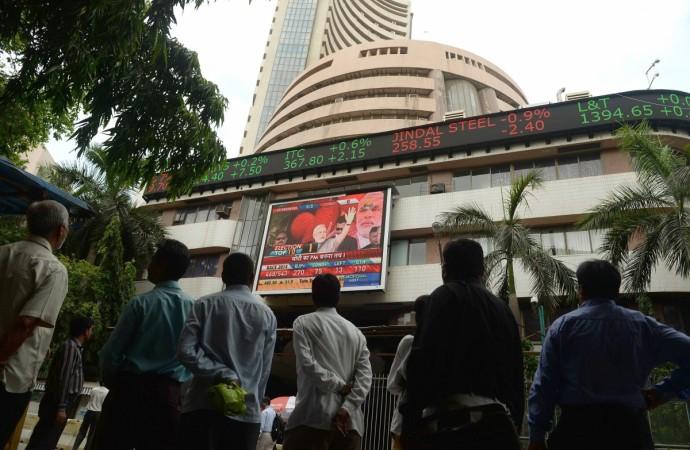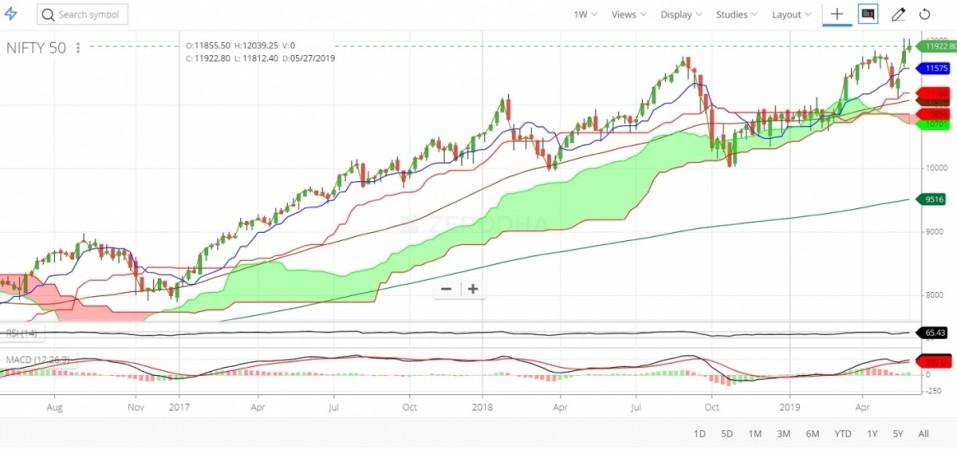
The market's correction towards the end of a pyrrhic week of election-induced volatility signals likely caution on global cues and domestic slowdown worries, market reports say. While traders will be watching for the right noises from members of the newly appointed Cabinet of Prime Minister Narendra Modi, who returned with a thumping electoral win, the markets may trade sideways until National Stock Exchange (NSE) Nifty closes for successive days above 12,100.
The Bombay Stock Exchange (BSE) Sensex and Nifty gained about 0.7 per cent through last week driven by technology, private banks and energy stocks, a report in MoneyControl says. The Nifty Midcap index outperformed front-liners, rising 1.5 per cent. Experts suggest caution during the next couple of weeks by picking stocks with strong fundamentals.
The market ended higher for the third consecutive week except for a mild correction on May 31 after the Cabinet portfolio allocation was announced. Nifty closed on Friday at 11,922 points, down 23 points or 0.19 per cent, after coming off a high of 12,039, just two points shy of the all-time high of 12,041 points visited following the exit poll prediction of a Modi wave in the Lok Sabha election 2019. The market's lack of direction was clear in the one point discount on the Nifty Jun FUT premium that closed at 11,921 points. Sensex closed at 39,711 points, down 117 points or 0.3 per cent at market close on Friday.
The worsening trade war worries indicated that the market could be rangebound in the coming truncated week (on account of the Muslim festival of Eid-ul-Fitr on Wednesday). Though the overall sentiment remains bullish a further correction could not be ruled out, experts said.
Traders will be closely watching the Reserve Bank of India (RBI) Monetary Policy Committee's interest rate decision on Thursday when the street expects a rate cut. But market action may depend on how much the rate cut exceeds expectation and any guidance wording that could indicate what the future holds.

The US-China trade tensions that have hit the global markets will continue to influence Indian markets. At the global level, the markets are closely watching the impact of China's retaliatory tariff hike that came into effect on Saturday and is expected to hit $60-billion worth of imports from the US.
Beijing was responding to US President Donald Trump's raising the tariff to 25 per cent from 10 per cent on $200-billion worth of imports from China. Chinese President Xi Jinping must be watching closely the developments following Trump threat to hit another $300-billion worth of imports with higher tariffs in the next round.
"We expect the markets to be rangebound and news-driven in the next week. With enthusiasm over the BJP's majority win having subsided, the markets would track the macros and global cues. Next week's RBI's monetary policy outcome will dictate further market trends in the coming sessions," the report quotes Jayant Manglik of Religare Broking as saying.
The market may take note of the weak gross domestic product (GDP) growth of 5.8 per cent for the last quarter of the 2018-19 financial year which is the lowest in 20 quarters, resulting in 6.8 per cent annual GDP growth for FY19. The unemployment rate of 6.1 per cent, the highest in 45 years, will also contribute to market gloom. A likely delay in the onset of the monsoon may also cloud the trading through the coming week, according to reports.









